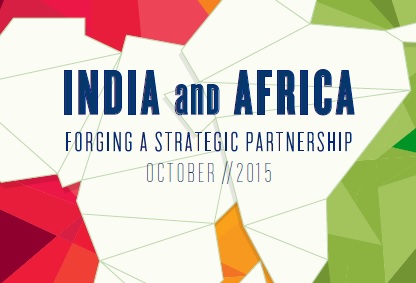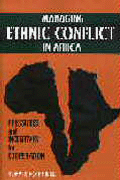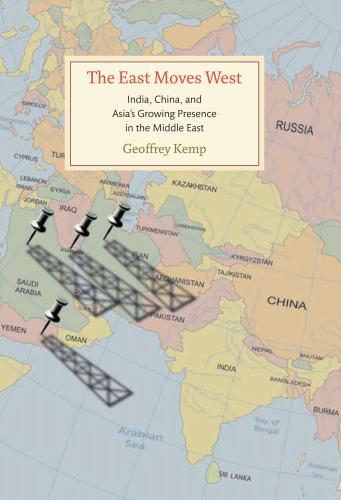Content from the Brookings Institution India Center is now archived. After seven years of an impactful partnership, as of September 11, 2020, Brookings India is now the Centre for Social and Economic Progress, an independent public policy institution based in India.
The chapter is part of a briefing book ‘India and Africa: Forging A Strategic Partnership’ edited by Dr. Subir Gokarn, Dr. WPS Sidhu and Shruti Godbole.
Africa Rising?
From the 1980s and the 1990s, when large numbers of Africans, despondent from a combination of civil wars, coups d’etat, pandemics and puny economies, migrated to Western countries in large numbers, Africa has now become the subject of more positive global attention and interest.
But, is this development, in which Africa has come to be regarded as the “last frontier” of the global economy- an inevitable outcome of globalization – really a cause for celebration? Will it lead to the real rise of the continent as an economic power in the mold of Asia or the West? Is Africa engaging the world – and globalization – on its own terms? Or are we seeing another, more-sophisticated-than-1885-Berlin scramble for Africa?
The World Bank calculates that Africa received capital flows of $48.2 billion in 2011, an increase of $8 billion, and notes that “the region is increasingly being recognized as an investment destination”. Yet Africa’s share of world trade is a minute 3 per cent, with less than 5 per cent of Foreign Direct Investment (FDI) flows. In 2010 the combined GDP of the 54 countries that make up the continent was just barely equal to that of India, and just 100,000 individuals account for 80 per cent Africa’s GDP, while the continent’s share of global poverty rose by 8 per cent between 1999 and 2008. The GDP of the entire sub-Saharan Africa, including South Africa, is just about equal to that of Belgium or that of metropolitan Chicago, a city in the United States. And all the electricity produced in sub-Saharan Africa, half of which is, in fact, produced by South Africa, is equivalent to that of Spain, which has 20 times fewer people than Africa.
It is true that Africa’s macroeconomic context today is probably better than it has ever been, and that Africa will increasingly become a consumer of commodities – including its own – rather than merely exporting them. But this remains an opportunity, not an arrival at the desired destination. It is important to acknowledge the undoubtedly better trends that have emerged in the continent – and given how beaten down Africa’s image in the world had been before the advent of the last decade, one supposes that a bit of celebration at this new turn of events is not completely out of place. But circumspection is still required.
Economic globalization has hurt Africa. The gains for African countries from opening up to international economic forces without adequate internal preparation have been limited and far outweighed by the adverse impact of the continent’s engagement with economic globalization. Economic policies enunciated by the Bretton Woods Institutions – the International Monetary Fund, the World Bank, and the World Trade Organization – led to lost decades of development opportunities and outcomes. Structural adjustment and liberalization without the proper foundations as a core condition led to t he effective de-industrialization of the continent by weakening the manufacturing sector, increased income inequality, and marked drops on average per capita incomes in many African countries. Trade liberalization under WTO regimes has not brought benefits. It has removed incomes from tariffs previously available to African countries, and these incomes have not been replaced by effective internal resource mobilization through taxes and other methods.
Nevertheless, one of the paradoxes of globalization is that the phenomenon has so opened up the world and its inhabitants to each other that the prospects and opportunities for economic advancement are now almost universal. This process, underpinned by the invention and innovation of industrial technology that began two hundred years ago after the industrial revolution, is not a secret. It is open to any country or region that is prepared to harness it. Perhaps the secret lies in what is beneath the surface – the full understanding of all the dimensions of that process and the preparation to harness the recipe. It has nothing to do with the presence or absence of natural mineral endowments. If it did, Africa would have long ago become the richest continent in the world rather than the impoverished one it has been.
It is against this backdrop, in which Africa has come to view Asia, in particular China, as a viable economic model, that we can examine the continent’s growing relations with another rising power on the Asian continent – India.
India, Africa and the 2015 Summit
The India-Africa relationship goes back to thousands of years over which Indian mer chants and Africa have traded. In the more contemporary past, India and African coun tries collaborated closely in the Non-Aligned Movement during the Cold War, and in the struggle against Apartheid in South Africa.
But the intricateness of this relationship are yet to be reflected fully in the contemporary economic sphere, and China’s rising economic engagement in Africa is today the dominant reference point. China’s trade with Africa hit $210 billion in 2013, with 2,500 Chinese companies operating in the continent.
India-Africa trade is playing catch -up, projected to get to $100 billion in 2015. India is now the largest trading partner of Nigeria while India is now the largest importer of Nigerian crude oil. But Africa has far more in common with India. An increased strategic economic engagement between the two partners has the potential to be much more genuinely beneficial to both parties than the increasing criticisms of a certain lopsidedness in China’s relations with the continent. The 2015 India-Africa Forum Summit should reposition India-Africa economic relations along some deeper contextual commonalities than merely transactional activity.
This approach will enable African countries gradually emerging in the global economic consciousness to achieve transformational outcomes beyond simply being a stage for global economic competition between rising powers, such as India and China.
The common challenge that confronts India and Africa is their struggle against poverty. In India, these tensions are represented not only in the economic philosophies of the previous and present national governments but is also evident in the criticism of the late Indian management guru C.K. Prahalad, who highlighted “the fortune at the bottom of the pyramid”, by Raghuram Rajan, the Reserve Bank of India Governor who has said that micro-lenders should not seek to make a fortune off the poor.
Put differently, this argument is about inclusive business. With Africa gradually emerging as a continent of possibilities and opportunity in the global economy, and with India rising as a global power in the 21st century, the 2015 India-Africa Forum Summit must go beyond pomp and pageantry to set a concrete set of objectives with time frames for their achievement. Given the shared history of trade and immigration between the two, and several similarities of circumstance and challenges, this should not be too difficult.
The need for such specific outcomes from this summit is even stronger because Africa is the ‘last frontier’ of the global economy with which it appears every other region of the world seeks a preferential relationship. Summits with African countries and their leaders are becoming a crowded affair. India’s third and enlarged Africa summit joins five others — those between China, United States, the European Union, Japan and Turkey individually with African countries. Since differentiation and brand uniqueness are important aspects of strategy, India as the host should adopt a well thought out value proposition for a deepened economic, technological and diplomatic collaboration with their African guests. African countries, for their part, need to find common ground on the mutual benefits they can share with India more broadly as a continent, and more specifically between each of them as different countries, with India.
This is the foundation on which India-Africa relations must now proceed. The world has changed markedly from the days of the Cold War, the Non-Aligned Movement, and the struggle against Apartheid. These were the predominant anchors of the India-Africa relations of that era. Today, the economic ambitions of India and Africa, with both parts of the world experiencing marked economic growth but still contending with the challenge of widespread poverty among their populations, create an imperative for win-win partnership.
African countries should no longer allow themselves to be pawns in a chessboard of great or rising power rivalry between India, China, the United States and other dominant global economic actors.
With India and virtually all African countries having discarded state-dominated “command economies” for the free market to varying degrees, the two sides will benefit much from a mutual review and sharing of experience from the trade-offs between different kinds of capitalist frameworks for economic growth and development.
The path to real economic transformation in Africa, which is what the continent’s leaders seek, does not lie in the export of its raw materials and imports of finished, value-added products.
The path to transformation is to develop Africa’s human capital and make manufacturing the basis of its trade with others. India has significant capacity and experience in these areas, including the manufacture of automobiles.
The India-Africa relationship should be anchored on investments by Indian firms in African countries and access to Indian markets for African multinationals, of which several exist in areas such as telecommunications, cement manufacturing, banking, and others. Developing investments in social infrastructure such as education and healthcare through online education that transfers technical skills, or well equipped hospitals in African countries to reverse the flow of “medical tourism” would be excellent areas for expanded collaborations.
Africa and India have come a long way, and have a long path into a future in which they are both emerging and rising players. The better angels, however, are in the details of how they can expand their relationship for mutual benefit.








